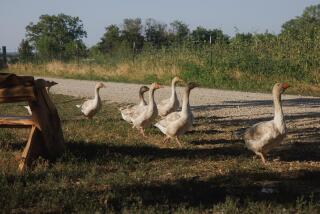Crops spring from an urban rooftop
The last thing a New Yorker expects to find atop a massive building in industrial Queens is a farm.
We’re talking 140 rows of crops, including leafy greens, tomatoes, even fancy Japanese turnips — as well as high-tech irrigation and five plump hens who enjoy a sixth-story view of the Manhattan skyline that any penthouse dweller would pay millions for.
The Brooklyn Grange, named before its young founders settled on another borough, is the city’s largest rooftop commercial farm — and one of the few here, on or above ground.
“It just makes sense to utilize the open spaces we do have in the city to benefit the community,” says Ben Flanner, head farmer and a co-founder.
Flanner is a 30-year-old hipster-hayseed who came to New York from Wisconsin for a job in finance and threw it all away to turn a compost pile as big as a king-size bed.
His blue eyes widen when the notion is raised that maybe it’s a little weird to be rotating crops on top of a building surrounded by gas stations, car dealerships and tire shops. Or that as wildly enterprising as it may seem to dump 1.1 million pounds of dirt to seed an acre of crops, isn’t it awfully close to La Guardia Airport’s landing route?
Flanner nods brightly. “Yup,” he says. “We are amid 8 million people, but the farm allows them to know us and us to know them.”
Tall and lanky, Flanner says he never considered farming in a normal place, say, Iowa or even upstate New York. His previous farming experience was on a much smaller roof in Greenpoint, Brooklyn. The engineering graduate put numbers on an Excel spreadsheet and realized that to make a profit, he needed more space.
Last year, Flanner and his partners, also Brooklynites unafraid of dirt under their nails, raised $200,000 from investors and even bake sales, and hunted around for a location, eventually settling on a sturdy 1919 building in Long Island City with a 38,164-square-foot roof empty except for air conditioning units and a water tower.
It took awhile to get the city to allow farming on the roof, under an obscure designation. “They had to dust off that one,” Flanner says with a chuckle.
With the farm about to end its second season, Flanner is vague about whether it has made a profit. “We’re hitting our target numbers to stay alive,” he says. He and an assistant are the only paid staff.
Flanner spends weekdays in running shoes and soil-stained khakis planting seeds and tending eggplants, and weekends selling crops at farmers markets. The farm also supplies produce to a few restaurants and throws “sunset” dinners on a giant wooden table in the middle of the crops.
“Nothing we grow travels more than three miles,” Flanner says proudly.
While the farm’s carbon footprint may be the size of a baby’s shoe, growing on a rooftop also presents special challenges.
Much of the weeding and picking is done by interns and volunteers who aren’t always the most competent hands. Wind is also a constant, whipping across the East River, and there is a steady stream of visitors who drop by unannounced and stroll through the dirt pathways. Pesky pigeons are always hanging around the hens, and summer squash and beets just won’t grow in soil that is only 7.5 inches deep.
Michael Meier, 24, who has been the farm apprentice for its second growing season, startles a little when an air conditioning unit suddenly roars on while he’s giving a tour.
He laughs off the noise and other distractions.
“It’s truly amazing to spend an hour kneeling, thinning a bed of carrots, and then get up and see this,” he says, sweeping his hand across a panorama of bridges, billboards and red-and-white utility stacks.
Particularly on hot summer days, the farm is an oasis, Meier says.
“You’d be surprised in the summer how much it feels like you’re out in the country here,” he says, describing butterflies chasing each other around bamboo used for staking, and the smell of flowers and ripening fruit.
A Florida native, Meier describes himself as a foodie who has been “homesteading” — growing his own food on rooftops — since he came to New York for college.
On a recent rainy fall day, he surveyed what was left of the rainbow chard, radicchio and a few other late-season vegetables. The farm is now focused on sowing rye and oat grass as ground cover to hold down the soil during the windy winter months.
“Yes, we’re in New York City, but we also have to deal with seasonality,” Meier says. “We can’t just go back into our apartments for the winter and forget about it here.”
Just then, Jeffrey Polsky emerges at the stairwell entrance. A singer-songwriter who lives nearby, he shows up usually on Wednesdays when the farm sets up a table to sell produce in the building’s modern lobby, and often takes a detour up the elevator to the fifth floor and walks the last flight to the roof.
“I’m all for movie studios,” he says of the newest tenants to infiltrate the old Queens warehouse district, “but the farm brings real people, and when you live in the city it’s hard to have a sense of what you’re missing.”
He looked around at the sodden ground and sparse crops yet to be picked, and sighed.
“I came up to say goodbye for the winter,” he says, pulling his jacket around him against the rain. “Even though it’s sad to see it like this, it’s part of the cycle and it will be back.”
More to Read
Sign up for Essential California
The most important California stories and recommendations in your inbox every morning.
You may occasionally receive promotional content from the Los Angeles Times.









